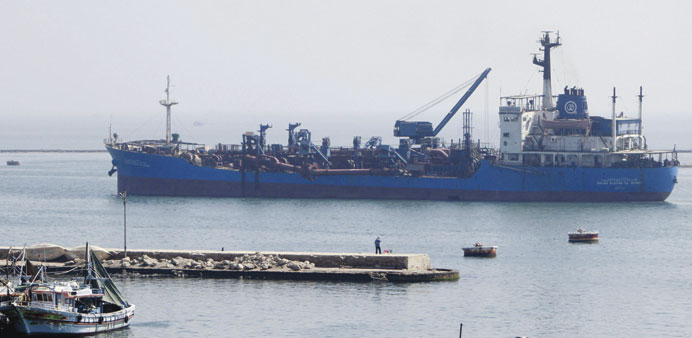A ship passes through the Suez Canal near Port Said, 170km (106 miles) northeast of Cairo. Egypt’s budget deficit is expected to narrow to between 11% and 11.5% of gross domestic product in the fiscal year ending this month, outgoing Finance Minister Hany Kadry said in May. The shortfall was about 14% the previous year.
Bloomberg/Cairo
Egypt will probably restart loan talks with the International Monetary Fund as Gulf Arab allies say they need partners to help revive the struggling economy, according to the country’s biggest investment bank.
Egypt needs between $10bn to $15bn in the fiscal year starting next month to help finance the budget deficit and stabilise foreign currency reserves that have fallen 50% since 2011, said Mohamed Abu Basha, Cairo-based economist at EFG-Hermes Holding.
While most of the money will likely come from Gulf allies such as Saudi Arabia and the UAE, a forecast “funding gap for the next two to three years” will require broader sources of assistance, he said.
“Going to the IMF is a matter of when, not if,” Abu Basha said in a phone interview. “The timing isn’t yet clear but it probably won’t be before the second half of the fiscal year.”
Saudi Arabia and the UAE are already seeking to bring in other donors to help Abdel-Fattah El-Sisi, the former military chief who won last month’s presidential election, revive an economy battered by three years of unrest. Saudi Arabia called for an international aid conference, while the UAE said it wants to enlist the help of institutions such as the IMF and the World Bank, urging both to show flexibility in dealing with the North African country.
Egypt has repeatedly engaged in loan talks with the IMF after the 2011 uprising that toppled Hosni Mubarak, without concluding a deal. Since the July ouster of former president Mohamed Mursi, Saudi Arabia, UAE and Kuwait have pledged about $15bn in aid. The UAE said it was working with Egypt on a plan to revive the economy.
Egypt’s budget deficit is expected to narrow to between 11% and 11.5% of gross domestic product in the fiscal year ending this month, outgoing Finance Minister Hany Kadry said in May. The shortfall was about 14% the previous year.
Kadry said in May that there would be no change in the country’s current relations with the IMF before upcoming parliamentary elections and the formation of a new government. Philippe Dauba-Pantanacce, senior economist for the Middle East and Turkey at Standard Chartered Bank, said the Gulf money “could diminish the incentives to rush to an IMF deal that would come with” conditions.
Egyptian authorities, though, have already pledged to pursue measures such as cutting energy subsidies to shore up public finances and spare money for investments. They also won IMF support for a proposed tax on the profit of equities investors.
Former Finance Minister Samir Radwan, who was part of an earlier government push to secure an agreement with the fund, said an Egypt-IMF deal wouldn’t be just about money. “No matter how much money we are getting from the Gulf, I think we still need to sign this agreement to show that we have a set of reforms which will set the Egyptian economy on the right road to recover,” he said by phone. “We may be going back to the IMF sooner than people think.”

